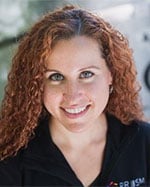Dr. Engel Stays on the Cutting Edge of Drug Discovery as a Scientific Liaison
In August of 2010, Brienne Engel, PhD began her scientific career in the Cancer Biology PhD Program at Moffitt Cancer Center. She worked in the lab of Dr. Doug Cress focusing on two projects. The lung SPORE project and the Ponce School of Medicine project. The latter project introduced her to the Ponce U54 Program.
 The primary goal of the U54 Ponce Health Sciences University-Moffitt Cancer Center (PHSU-MCC) Partnership is to allow for cross-institutional training of students from Moffitt/USF and PHSU in specialized areas of cancer. Students from each institution are given the opportunity to train and do research at the partner institution.
The primary goal of the U54 Ponce Health Sciences University-Moffitt Cancer Center (PHSU-MCC) Partnership is to allow for cross-institutional training of students from Moffitt/USF and PHSU in specialized areas of cancer. Students from each institution are given the opportunity to train and do research at the partner institution.
Dr. Engel took this opportunity and spent six weeks in Puerto Rico studying and exploring. According to Dr. Engel, the experience was wonderful and the community was very welcoming. "I was the only student who did the rotation that year so I had to integrate a little bit more with the community of scientists that were there year-round. I was able to convince each person in my lab to do one touristy thing with me," Dr. Engel recalled fondly.
After finishing grad school, Dr. Engel spent five years in a consulting firm called Yet2, a small technology scouting and consulting firm focused on innovation. During her time there, she worked with large Fortune 500 companies to find the next big thing in whatever area of interest they had and spent time on biology and life sciences-focused projects. This allowed her to acquire a broad view of different technologies in a number of different areas. “One of my favorite clients to work with was NASA,” said Dr. Engel, "They are excited by science and technology and it was fun to think about how some of the work we were doing would enable people to go to Mars."
In June of 2020, Dr. Engel began working at the Broad Institute as a scientific liaison. Her job, in particular, is to work with all of their outside collaborators to understand what their research question is and come up with an experimental design that makes sense for what they’re trying to accomplish. She is also the last set of eyes that looks at data before it goes out to collaborators and answers questions they may have on what the data looks like, what it means, and how the Broad Institute came up with those findings.
"It’s fun that I get to touch each piece of the process and understand what’s going on, even though I’m not actually in the labs anymore," said Dr. Engel. She enjoys staying what she calls "science adjacent."
"I get to keep an eye on what’s going on in the labs and have conversations about new therapies but I don’t have any of the pressure to publish. I’m really happy with where I landed," she stated.
The COVID-19 pandemic was in full swing when Dr. Engel started working at the Broad Institute and one of her biggest challenges was working remotely from day one. She was trying to effectively manage communications while never having actually met the people on her team. Fortunately, she was able to make it work and quickly discovered one of the things she loves most about her new position – staying on the cutting edge of drug discovery. "It’s fun having that sneak preview before [new therapies] come out and being able to get excited about the new therapies and watch their journey," said Dr. Engel.
Looking back on her time at Moffitt, Dr. Engel noted that her internship in the Tech Transfer Office (now called the Office of Innovation) directly enabled her consulting job. This internship taught trainees about commercializing all of the different technology coming out of labs. Students learn best practices and the steps involved in bringing these technologies from bench to bedside.
"It’s interesting to get that lens of how to think about your research as a commercial product, which is not necessarily the driving force for doing research but it is something to be aware of and know more about," said Dr. Engel.
Dr. Engel wants to remind all trainees that the training they receive unlocks so many different opportunities and career tracks and the skills they learn doing sciences can be applied to almost any field. "If you are learning how to evaluate information objectively and think about how to understand different areas and tie knowledge together, there’s almost no career track that doesn’t benefit from that," she stated.
Dr. Engel is open to being contacted (you can do so by visiting her LinkedIn page) and would love to discuss ways to explore what different career tracks might look like.
Where Are They Now
- Office of Postdoctoral Affairs
-
Office of Graduate Affairs
- Artificial Intelligence and Machine Learning in Cancer Research PhD
- Cancer Biology PhD
- Cancer Chemical Biology PhD
- Cancer Immunology and Immunotherapy PhD
- Integrated Mathematical Oncology PhD
- Medical Physics PhD
- MD/PhD Program
- Faculty Members
- Graduate Level Oncology Warriors
- Medical Student Training to Enhance Oncology Research
- Office of Undergraduate and Visiting Scholar Affairs
- Pre-College Programs
- What We Provide
- Contact Us
- About Tampa Bay
- News
- Where Are They Now
